












By Panashe Matemba-Mutasa Mshale
Michelle Phillips has officially assumed the position of Director of the Minneapolis Department of Civil Rights after being sworn in last Tuesday, July 16. Nominated by Mayor Jacob Frey in May and unanimously confirmed by the City Council later that month, Phillips brings a wealth of experience to the role.
“The City of Minneapolis is fortunate to have such a highly qualified leader serve as our new Director of Civil Rights,” Frey said. “We need leaders like her championing civil rights for our city.”
Former department director Alberder Gillespie was fired in February amid an accumulation of police misconduct complaints, with city operations officer Margaret Anderson Kelliher stating she posed “an immediate threat” to the city’s efforts to comply with court-approved police reforms that were established after a Minneapolis police officer killed George Floyd in 2020. Gillespie was roughly two years into her four-year term.
Phillips arrives in Minneapolis after serving as the first Inspector General for the City of Oakland, California. Her extensive background in civilian oversight of police includes promoting constitutional policing and building departmental infrastructure for thorough and fair investigations. Before her tenure in Oakland, Phillips was the Deputy Inspector General in Baltimore, where she led an investigative team dedicated to eradicating fraud and abuse, thereby fostering trust in local government.
According to The Oaklandside, a news outlet in Oakland, Phillips had recently urged the Oakland Police Department to switch over to a more reliable system for reporting crime data. She also gave the department recommendations to reduce instances of racial profiling and bias-based policing practices. And Phillips identified a problematic relationship between the Community Police Review Agency and the police department’s Internal Affairs Division that threatened to erode the independence of each office’s inves- tigative process.
“This leadership and change management expertise will benefit the City of
Minneapolis at a critical moment for our Civil Rights Department,” said City Operations Officer Margaret Anderson Kelliher.
Upon being sworn in, Director Phillips emphasized the importance of addressing the city’s challenges and working towards sustainable solutions, saying she shares Mayor Frey’s vision of equitable, just, and accessible services for residents and business owners.
“Identifying a path forward with tangible solutions and sustainable impact is vital,” Phillips said.
The Minneapolis Department of Civil Rights enforces the city’s ordinances, investigates discriminatory practices, protects members of protected classes, and promotes civil rights awareness among residents, businesses, and government entities.
Through its Office of Police Conduct Review, the department also plays a pivotal role in implementing reform efforts mandated by the settlement agreement with the Minnesota Department of Human Rights.
By Stacy M. Brown Black Press USA
As he continues to battle the twiceimpeached and 34-times-convicted felon and Republican Presidential nominee Donald Trump, President Joe Biden has not stopped working to improve the lives of the poor, disadvantaged, and disenfranchised. In his latest effort to level the playing field, Biden announced a series of actions to make renting more affordable for millions of Americans.
The president’s plan includes:
• Legislative push: Calling on Congress to pass a law forcing corporate landlords to cap rent increases at 5% or lose valuable federal tax breaks.
• Public land repurposing: Utilizing public land to create up to 15,000 affordable housing units in Nevada.
• Housing rehabilitation: Revitalizing distressed housing and neighborhoods, particularly in Las Vegas, Nevada.
Biden emphasized the urgent need for Congressional action to make the American Dream accessible to more families.
His proposed Biden-Harris Housing Plan aims to build two million homes and provides $10,000 in mortgage relief, potentially unlocking homeownership for millions. Housing construction has already reached its highest level in over 50 years, with new housing starting up 17% compared to the previous administration.
A significant element of Biden’s plan is cracking down on corporate landlords who have exploited housing shortages by imposing steep rent hikes. “Corporate landlords have raised rents far beyond their own cost increases, reaping huge profits while millions of Americans struggle to afford their homes,” Biden stated.
The president is urging Congress to pass legislation that gives corporate landlords a choice: cap rent increases at 5% or lose federal tax benefits. This policy would apply to landlords with over 50 units and is designed to stabilize rents while new housing is built.
The Federal Housing Finance Agency (FHFA) will introduce new protections for renters in multifamily properties financed by Fannie Mae and Freddie Mac. These include a mandatory 30-day notice before rent increases, lease expirations, and a five-day grace period for late fees.
Repurposing public land for housing
The administration is also repurposing federal land to build thousands of affordable homes. The Bureau of Land Management (BLM) will sell 20 acres of public land to Clark County, Nevada, at below-market rates, enabling the
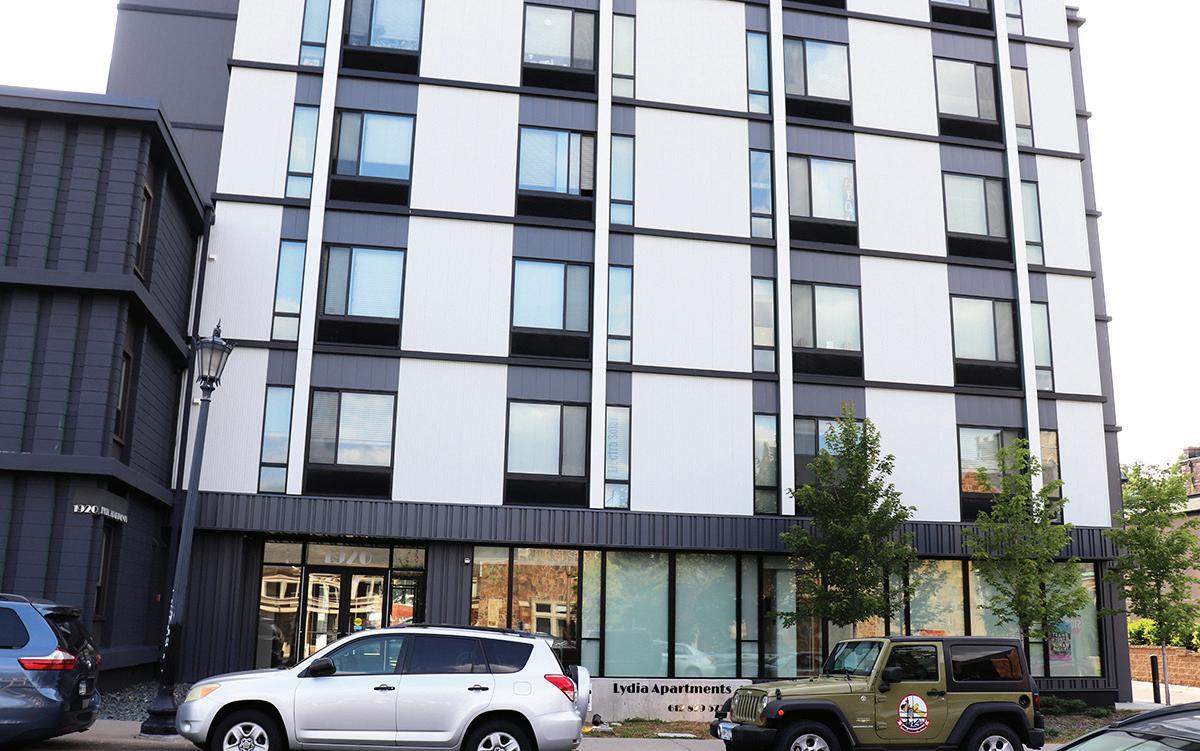
construction of nearly 150 affordable homes. Additionally, 562.5 acres in Southern Nevada have been identified for potential housing projects, which could create up to 15,000 new units.
The United States Forest Service (USFS) and the United States Postal Service (USPS) will lease land for workforce housing and repurpose surplus properties for housing developments.
HUD is announcing $325 million in Choice Neighborhoods grants to build new affordable homes, spur economic development, and revitalize communi-
ties nationwide. These grants will fund the construction of over 6,500 units and leverage $2.65 billion in additional investments. Cities such as Las Vegas, Syracuse, Chattanooga, and Miami are among the recipients.
Legislative roadblocks and Republican opposition
Despite these initiatives, Republicans in Congress have blocked Biden’s housing agenda. Efforts to cut rental assistance and programs that lower mortgage costs have been stymied, and Senate Republicans are currently holding up a bipartisan bill to help build 200,000 affordable homes.

Donald Trump’s Project 2025 is a major threat! As we look toward November’s presidential election, we must confront what this plan means for our community. This plan is a stark reminder of the hardships we faced under his previous administration, and it promises to deepen the challenges for Black Americans in critical ways.
We simply cannot ignore the projected economic impact Project 2025 will have on Black Americans. To know what we should expect looking forward, we must look back. Trump’s tax cuts continue to mainly benefit the rich along with big corporations, leaving many Black families with only a tiny fraction of the advantages. Project 2025 will undoubtedly worsen this by adding work requirements that unfairly target Black folks, feeding harmful stereotypes, and deepening racial job market disparities. Compared to other workers, African Americans are already half as likely to receive callbacks for entry-level jobs. These new requirements will only make economic stability harder to achieve.
Unfortunately, Project 2025’s plan to replace long-term civil servants with presidential appointees threatens the stability of many Black families. Black Americans make up 18.2% of the federal workforce, providing crucial, stable jobs. This proposal aims to create a “color-blind” society by stopping racial counts and erasing progress in workplace diversity and equal opportunity. This plan is simply a rollback from the progressive and inclusive workforce policy that has stabilized the wealth of Black earners since the 1960s. It jeopardizes the economic security and career prospects of thousands of Black Americans who rely on these government jobs for their livelihoods.
Another deeply troubling aspect of Project 2025 is its fervent attack on diversity, equity, and inclusion (DEI) efforts. This plan is an omnibus conservative policy initiative that seeks to end affirmative action and DEI initiatives, which have been crucial in fostering a more inclusive society. We’ve already seen the damaging effects of anti-DEI rhetoric in Texas, where the University of Houston closed its LGBTQ resource center, and the University of Texas at Austin fired dozens of DEIrelated employees. These actions undermine progress toward equality and harm marginalized communities, including Black Americans.
Similarly, the public education of our youth is also under attack. Project 2025
proposes to slash federal funding for essential programs like Title I and IDEA, which support low-income districts and students with special needs. This reckless approach would turn these funds into unregulated block grants, jeopardizing the futures of countless children. I know firsthand the importance of programs like Head Start, which provided a crucial foundation for my education. Dismantling these programs means denying the same opportunities to the next generation.
One of the most alarming aspects alluded to in the first debate is the proposed extreme abortion ban. They are stripping women of their rights and endangering their health. Maternal mortality affects Black women disproportionately. In many circumstances, elective termination procedures protect a woman’s right to choose the best possible outcome. Moreover, this agenda includes removing requirements for insurance to cover certain forms of contraception, further limiting reproductive choices for women of color. The right’s push to classify emergency contraceptives like Ella as abortifacients could exacerbate racial health disparities, as women of color already face systemic barriers to accessing reproductive healthcare.
Speaking of healthcare, the plan also threatens to remove the lower prescription drug costs and healthcare access that have been lifelines for many in our community, helping to achieve record-high insurance rates among Black Americans. At a time when inflation has spiked the cost of necessities, a drastic rise in prescription costs will be a death sentence for Black people with chronic illnesses.
In the face of these challenges, our resilience and unity are more important than ever. We must stand together to oppose Project 2025 and protect the progress we’ve made. Our community’s strength lies in our ability to support one another and fight for a future where everyone has the opportunity to thrive.
The stakes are incredibly high for Black Americans. Together, we can make sure our voices are heard and our rights are protected. Let’s remain vigilant, informed, and proactive.
State Representative Ron Reynolds represents District 27 in the Texas House of Representatives since being sworn in on January 10, 2011.

By UN News
With only 17 per cent of the Sustainable Development Goals (SDGs) on track and just six more years until the 2030 deadline, UN Deputy Secretary-General Amina Mohammed has called for a new era of inspiring leadership, ahead of a special event on Monday, July 15 to galvanize action.
The Special Event entitled Keeping the SDG Promise: Pathways for Acceleration is taking place on the sidelines of the High Level Political Forum (HLPF) now underway, aimed at getting the SDGs back on track and leaving no country behind.
It will give a boost to the so-called “High
SDG agenda. Be leaders for the planet and the things that we need to have put in place for a 1.5-degree world. Be leaders and inspire, that are accountable to the UN Charter. And come away from the UN knowing that this is the place where you will hear those voices and their expectations and aspirations. And that should give you the energy and the inspiration to go back and do the right thing.
UN News: The United Nations system unites around these six key transitions or pathways to acceleration. Can you tell us more about these areas and why it is so important to leave no one behind?
Amina Mohammed: We had very clear
We felt the impact of Ukraine on the food systems directly. We, of course, responded with the Black Sea Grain Initiative and that saved many lives.
But I think it was apparent that we could do more. And dependency on others was not always the best way to go. That is also a system that takes away from us getting to a 1.5-degree world.
The second was the transitions on energy. How do we make sure that energy gets to everyone? Access - whether it was for cooking or to small-scale industries such as education and health – and to really look at it off-grid. Not everything has to be on the grid. We can find mini-grids that power up whole communities - and especially if we were trying

Impact Initiatives” championed by the whole UN development system and key investment strategies, while also highlighting countries.
Speaking exclusively to UN News’s Mayra Lopes, the UN deputy chief emphasized six key transition areas for accelerating the SDGs which are essential to success: food systems, energy access and affordability; digital connectivity, education, jobs and social protection; and climate change, biodiversity loss, and pollution.
The interview has been edited for clarity and length.
UN News: The global community is meeting this week at the High-Level Political Forum. We still have six years left until the 2030 deadline for the SDGs. What is your message to leaders?
Amina Mohammed: Be leaders. Be leaders for people and what they need and the promises that are made in the
marching orders from Member States when they really did get the wake-up call of how badly off-track we were with the SDGs last year. 15 per cent, 17 per cent in some places. Not a pass mark. And for that, we had to think if this is an acceleration to 2030, what is it that would get resources in to get behind investments that would deliver on the SDGs? All 17 of them. And you’re not going to go out there talking about 17 ideas.
These are signposts for getting us to where we need to get to. So, we sort of clarified what those investments could be. Where business would come, the public sector is already there, where we could scale up, where the UN could reposition itself to help accompany countries to that. And so, those transitions made sense because we were talking about food systems.
Why were we talking about food systems? We had felt the impact of COVID and what that did to disrupt the world.
and make it more equitable? Close the divides that there are today. Create jobs that people feel they are losing or have lost.
And then, to put this in context, I think of two important things: the resilience of people that needs to be supported by, I would say, a social protection floor that takes from the country’s GDP. Then, you’ve got some resilience, and you can ensure that when you have these big knocks like COVID-19, that people are not knocked off track.
Last but not least, the enabling environment will become more difficult if we don’t take cognizance of what we would call the triple crisis: climate, biodiversity, and pollution.
UN News: I want to refer to the digital innovation part. I wanted to hear if you feel hopeful and how you think we can leverage this new technology?
Amina Mohammed: There was a gentleman who I met recently in Barbados. And he was the one who designed the search engine, the very first one we had called Archie. I said to him, so you tell me, what do you think about this new era of technology that you’re obviously very familiar with? And he said, “It’s very exciting, it’s very scary, and we’re not ready”. And I thought, well, that probably captured the reality.
The Secretary-General has put in place his offer to the Summit of the Future of how to put the guardrails around the potentials. There is a dark side to it, but there are so many opportunities, and I think that structure will help us to be safer.
It will help us to go further in a world that’s connected and we must do things about governance, about the way in which technology is used, whether it’s algorithms that are designed, have a bias against women.
to link that to food systems as well.
The third was connectivity. Of course, the new technologies are here now. How do we connect people? And in this particular instance, for what? Well, for financial services for women for one. We want to make sure that you can join the world without leaving your village, on e-commerce. That needs to be powered, to be connected.
And then we also thought that, well, education is not in a good place. So, that was a fourth transition. It’s not the transformation of education we want to achieve overnight. That’s the end game of what you want to put into it. But what is the first thing that perhaps needs attention? Young people are out of work. They’ve not had the education they ought to.
You want to connect them to markets. And to do that, if you’re transforming food systems skills, how could you do that with technology and do it better
But I think what is more important is when I said to him: “Is this like going from the horse and cart to the combustion engine when we industrialized?”. And he said, “No, it’s much more than that - because you’re talking about changing societies and the way we do things”. We will never be the same again because we will be so much more connected.
UN News: We are talking a lot about the SDG acceleration, but we have a very challenging landscape right now with wars and global tensions. How do you think we can still push for SDG acceleration in this scenario?
Amina Mohammed: Well, back to your first question. We need leadership. We need leadership at all levels. That’s not just the president of a country, but in all constituencies, business, civil society, young people.
That will be a key part of what should
By Tom Gitaa Mshale
Minnesotans are in for an exciting Liberian Independence Day treat with the staging of the Annual Independence Day Dinner and Ball, hosted by the Organization of Liberians in Minnesota (OLM) on Friday, July 26.
The popular Independence Day Ball, which is held annually to celebrate Liberia’s independence, is one of the most anticipated events in the Liberian community.
However, leading to the Ball, a host of other events will be happening, starting with a community appreciation barbeque on July 25 that will kick off the near weeklong celebration. That barbeque will happen on the parking lot of the Liberian Community Center in Brooklyn Park.
Thursday, July 25 will be Counties Day where organizers have described as a day to come get a “Taste of Liberia” with traditional Liberian dishes on sale. Funds raised will go to the respective county organization.
Tickets for the July 26 Independence Day Ball can be purchased by calling the OLM office or at the door. The celebrations will conclude over the weekend with a Field/Sports Day on
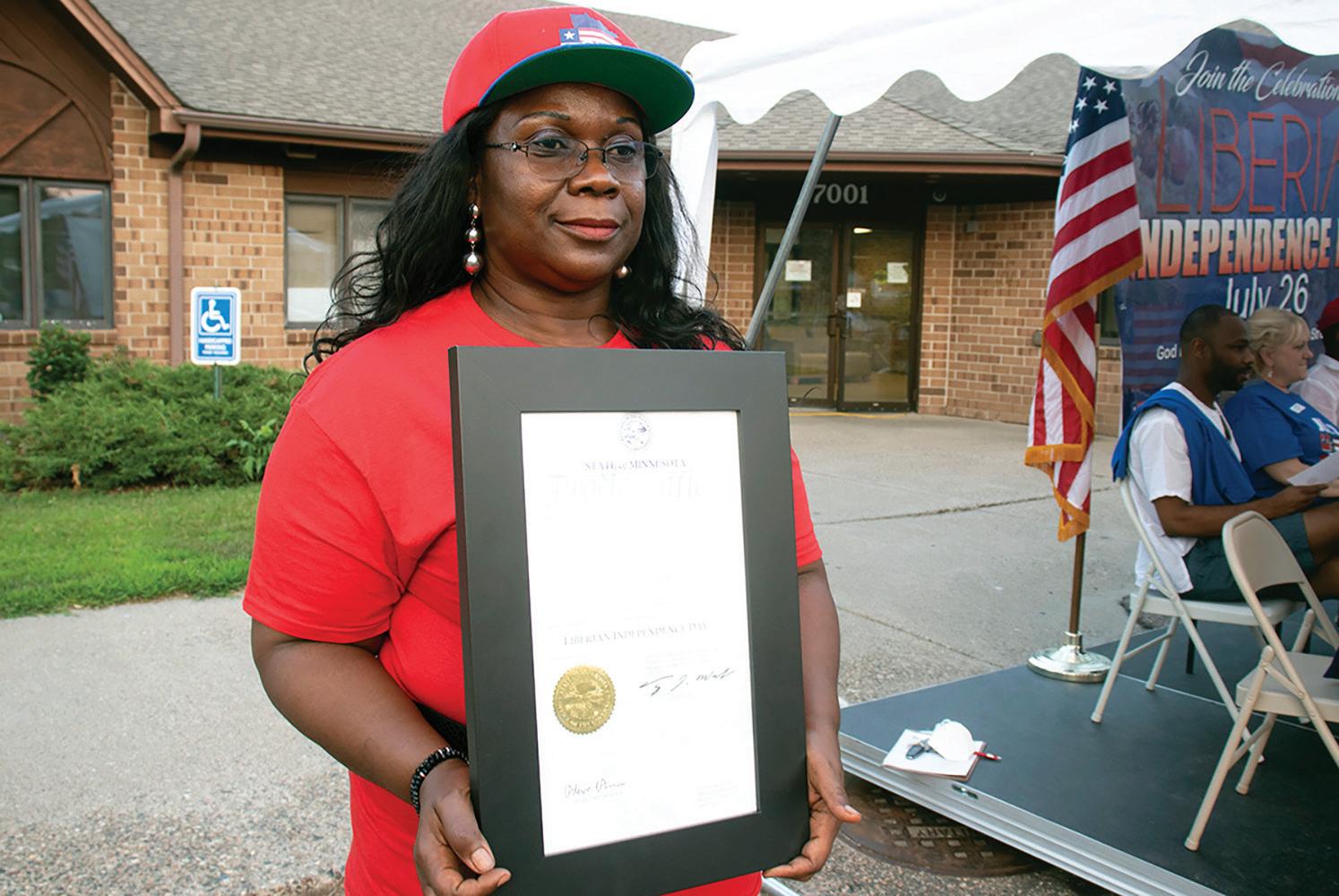
Saturday, July 27 and a Thanksgiving Concert at Ebenezer Community Church on Sunday, July 27 at 5pm. Details for the sports day had not yet been announced as this edition of Mshale went to press.
OLM executive director Kamaty Diahn said in a statement that Gov. Walz of Minnesota has issued a proclamation that July 26 will be “Liberian Heritage Day.”
Founded in 1973, OLM is a nonprofit

that provides Liberian immigrants and refugees with social support services including immigration, health, housing, employment, and educational aid. OLM has not announced whether there will be any dignitaries visiting from Liberia but the Independence Day celebration is known to attract surprise guests. Celebrations three years ago were graced by the presence of the chairman of the then ruling party in Liberia, Mulbah Morlu, who gave the keynote address and kickstarted the capital campaign for the community center that
now hosts many of OLM’s activities. Rep. Mohamud Noor who represents District 60B in the Minnesota House of Representatives will be among the speakers at this year’s Ball, according to Mr. Diahn.
The line up of events are as follows: Community Appreciation BBQ –Wednesday, July 24 @ 3pm-9pm.
Address: Liberian Community Center7001 78th Ave N, Brooklyn Park, MN 55445
Counties Day – Thursday, July 25 @ 3pm-8pm
Address: Liberian Community Center7001 78th Ave N, Brooklyn Park, MN 55445
Independence Day Dinner and Ball –Friday, July 26 @ 5pm-1am
Address: Mounds View Community Center - 5394 Edgewood Dr, Mounds View, MN 55112
Thanksgiving Prayer & Concert –Sunday, July 28 @ 5pm-7pm.
Address: Ebenezer Community Church - 7001 78th Ave N, Brooklyn Park, MN 55445
Tickets for the Independence Day Dinner and Ball can be purchased at the OLM office located within the Liberian Community Center at 7001 78th Ave N in Brooklyn Park or by calling the office at 763-270-5894. Waterside African Market also has tickets at their store located at 7500 Brooklyn Blvd, Brooklyn Park, MN 55443




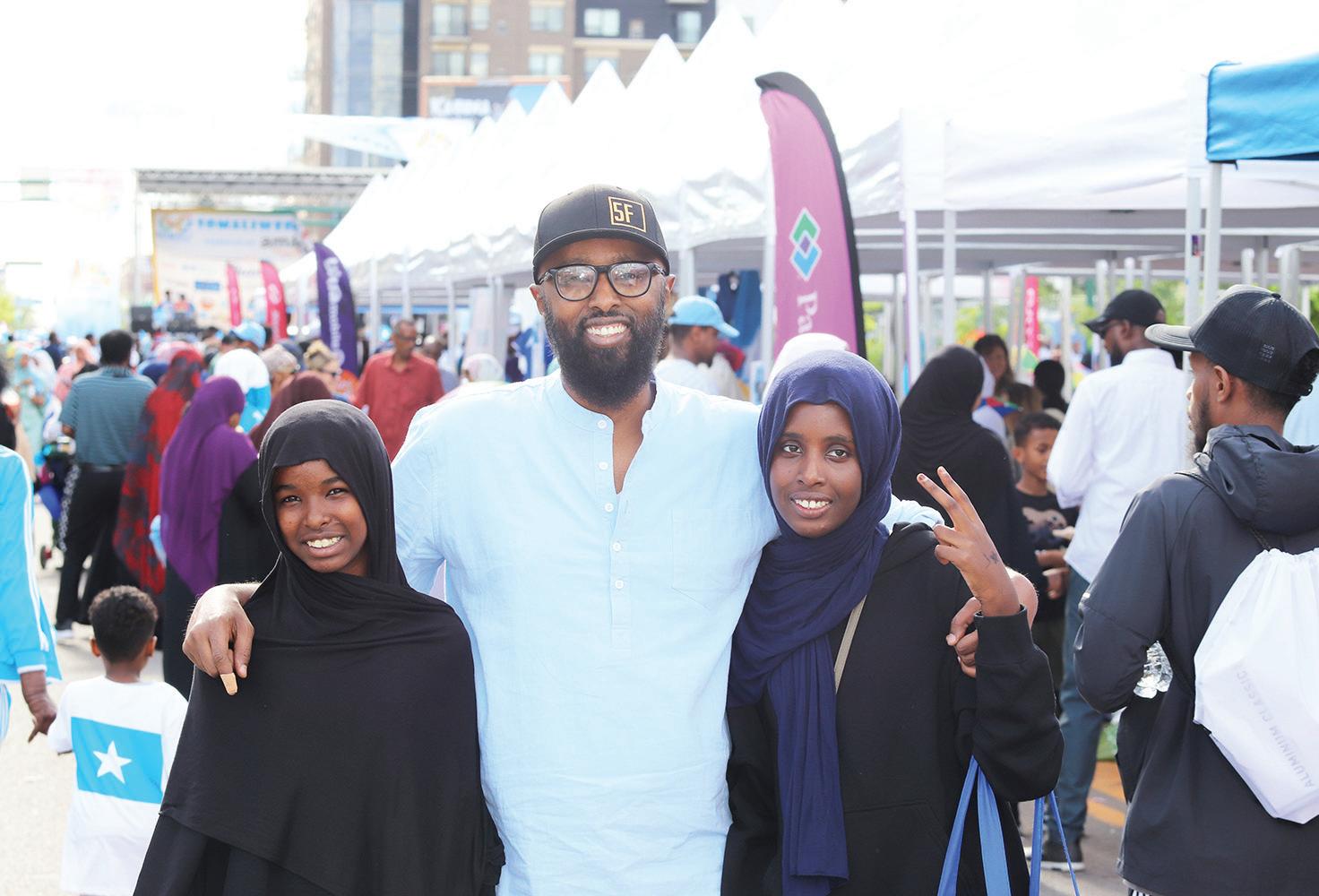





By Kwot Anwey Mshale
The flags were a sign that Somali Independence Day was nearing, and the Somali community was marking the day by holding a festival Saturday. Known as Somali Week, the festival drew thousands to a four-block stretch along Lake Street. The festival showcased simply a snippet of the pride Somalis hold for their country, despite challenges the East African country continues to face due to its history of political turmoil.
Entire families dressed from head to toe in blue sweatsuits and star-studded Somali clothes known as baatis. Songs like “Wavin’ Flag” by Somali Canadian artist K’Naan, and “One Love” by Bob Marley played as Somalia’s national flag swept West Lake Street. Next to vendor tents and Somali-owned food trucks, Adam’s Gyro and Halal Spicy King were lines of ecstatic children waiting for their chance to ride on a camel, merrily fluttering handheld mini flags in their hands.
“It’s a reminder of everything we’ve been through,” said Deeqa Ismail, a vendor and owner of Dhiil. “We celebrate through the flag. Everybody is wearing the flag.”
Somalia’s extensive coast, which gave

easy access to the Red Sea, the Gulf of Aden, and the Arabian Sea, made it attractive to various European colonial
No monthly premium. No copays for covered medical, prescription drugs and dental.
Plus, more than 30 extra benefits like these*
• Animatronic pet: dog, cat or bird
• Fresh produce home delivery
• Electronic tablet with well-being tools
HealthPartners® Minnesota Senior Health Options (MSHO) (HMO SNP)
Call 877-778-7898 (TTY 711) to find out if you’re eligible.
Oct. 1 to March 31: 8 a.m. to 8 p.m. CT, seven days a week; April 1 to Sept. 30: 8 a.m. to 8 p.m. CT, Monday through Friday.
powers. The modern country comprises of the former British Somaliland, and the Trust Territory of Somaliland, which was
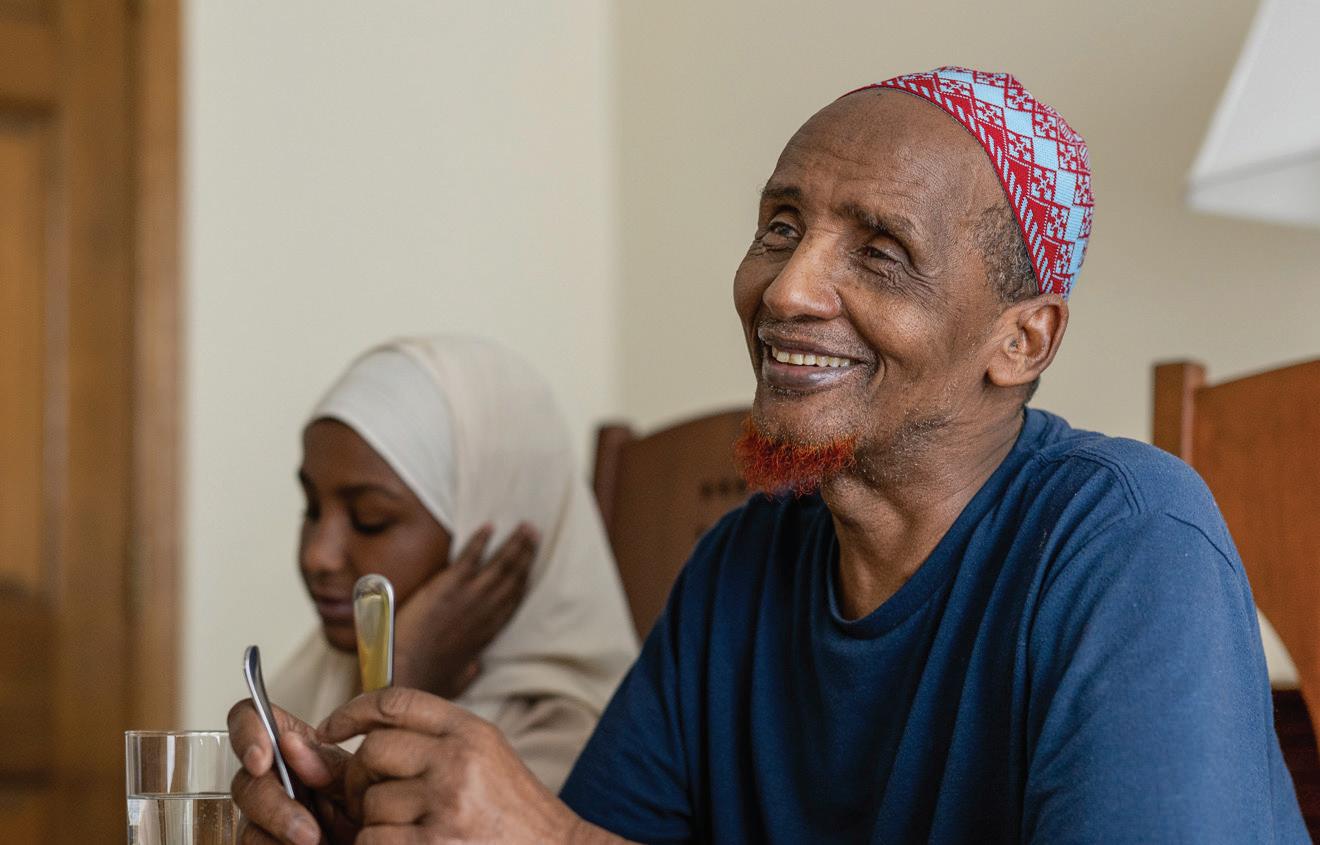

877-713-8215 TTY 711 mshosales@healthpartners.com
Discrimination is against the law. HealthPartners will accept all eligible Beneficiaries who select or are assigned to HealthPartners without regard to medical condition, health status, receipt of health care services, claims experience, medical history, genetic information, disability (including mental or physical impairment), marital status, age, sex (including sex stereotypes and gender identity), sexual orientation, national origin, race, color, religion, creed or public assistance status.
*Available to members with specific diagnoses who meet eligibility criteria. HealthPartners is a health plan that contracts with both Medicare and the Minnesota Medical Assistance (Medicaid) program to provide benefits of both programs to enrollees. Enrollment in HealthPartners depends on contract renewal. Available in 12 Minnesota counties. 23-2410552-2436301 (6/24) © 2024 HealthPartners
H2422_003396_M Accepted 8/5/23
overseen by Italy. On June 26, 1960, British Somaliland gained independence, and five days later, on July 1, merged with Italian Somaliland to create the independent republic Somalia.
After the 1991 outbreak of the Somali Civil War, and the resulting lack of a recognized government, refugees fled the country, with nearly two-thirds heading to neighboring countries like Kenya and Ethiopia. Minnesota also became a haven for Somali refugees. There are nearly 90,000 people of Somali descent living Minnesota, the most of any state, according to a Minnesota Compass analysis of 2021 U.S. Census Bureau data.
Yasmin Aden, a program specialist with the Minnesota Department of Public Safety, said that despite the history of Somalis immigrating to Minnesota, they still faced barriers. Aden said that she, through her work at the department, hoped to ensure that immigrants have pathways to the resources they need.
“Despite a lot of systemic barriers and a lot of language barriers, we continue to push on,” said Aden. “We continue to demand for the same amount of respect, the same human resources as anyone else, and that’s really admirable because it can be really easy as immigrants to kind of get lost in the noise of things and not demand for your rights.”
Somali Week was organized by Ka
Joog, a Minneapolis-based non-profit that aims to “motivate youth to pursue higher education, while promoting and building community ties at events throughout Minnesota,” according to the organization’s website. With more than 40,000 participants according to a website dedicated to Somali Week, the organization hosts multiple events throughout the duration of the week, including a soccer tournament, a Somali American business conference, and a concert.
The celebration took place in the Lyndale neighborhood between Blaisdell Avenue and Stevens Avenue, a block away from Karmel Mall, a vital African community shopping center.
Rep. Ilhan Omar, who is the first and only U.S. Congressperson of Somali background, along with former Prime Minister of Somalia Hassan Ali Khaire, were among notable attendees who paid homage to the largest Somali diaspora in the United States.
Khaire, who was visiting Minnesota for the first time, praised organizers of the festival and spoke on the significance of July 1, which is Somalia’s Independence Day.
He told the crowd that U.S. Rep. Ilhan Omar has elevated Somali identity globally, and that those that can vote should vote for her.
Surrounded by Somali-owned businesses stationed along Lake Street like Muhim’s Cafe and largely worked by Somali police officers, the festival speaks to the growing influence Somalis have on the Twin Cities area. Somalia from Pg. 7
from Pg. 4
make us hopeful. Rebirthing the United Nations [as] a stronger town hall for a global village, so that voices here are not only heard but acted upon.
We don’t all have the same muscle on that floor, but we do have a voice, and we can take that out and we must remember every day that the representation of our people is so diverse, and the needs are so complex.
Perhaps more important to me is how we find the resources for the development agenda, for peace, for security. But not security in the way in which we pay for war; but security in which we invest in the prevention - which is development.
We find ourselves in a system which was designed for a 1945 recovery from World War Two. “May we never know the scourge of war again”. But we have. And the same principles we applied then, which was to say people have to have access to resources to rebuild their lives, are exactly the same principles we need to have today to say you need to have long term financing for your development, wherever you are in the world.
My hope is that acceleration happens because we all understand there’s an existential threat with a 1.5-degree world hanging in the balance, that people will no longer sit on the sidelines.
And how they react depends on how much injustice they think they’re being
meted out by their local leadership, national leadership, and international leadership. So, this is a globe very much connected. Young people are full of energy. They are anxious because they don’t see a future.
If I go back to the creation of many terrorists, they’re not born. It’s an environment that excludes, an environment of injustice, an environment of no hope.
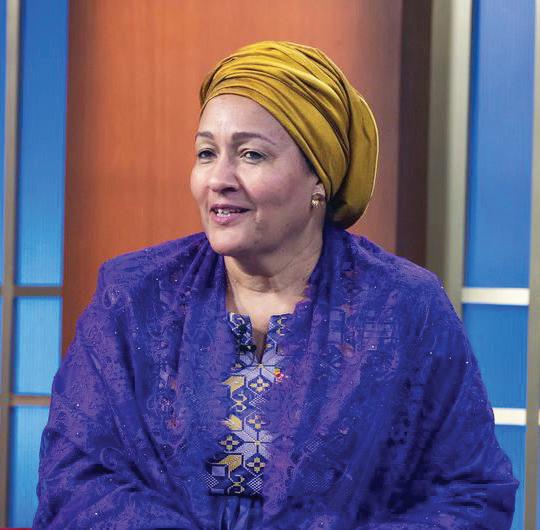
And therefore, a young person finds themselves easy fodder for those who would like to disrupt, in a way that is unfortunate.
So, I have hope that we have never been more equipped in a world with resources to do the right thing. We have an amazing framework and path to this through the SDGs. And I think that we should just get up and race this last mile and then deliver the promise of the SDGs.
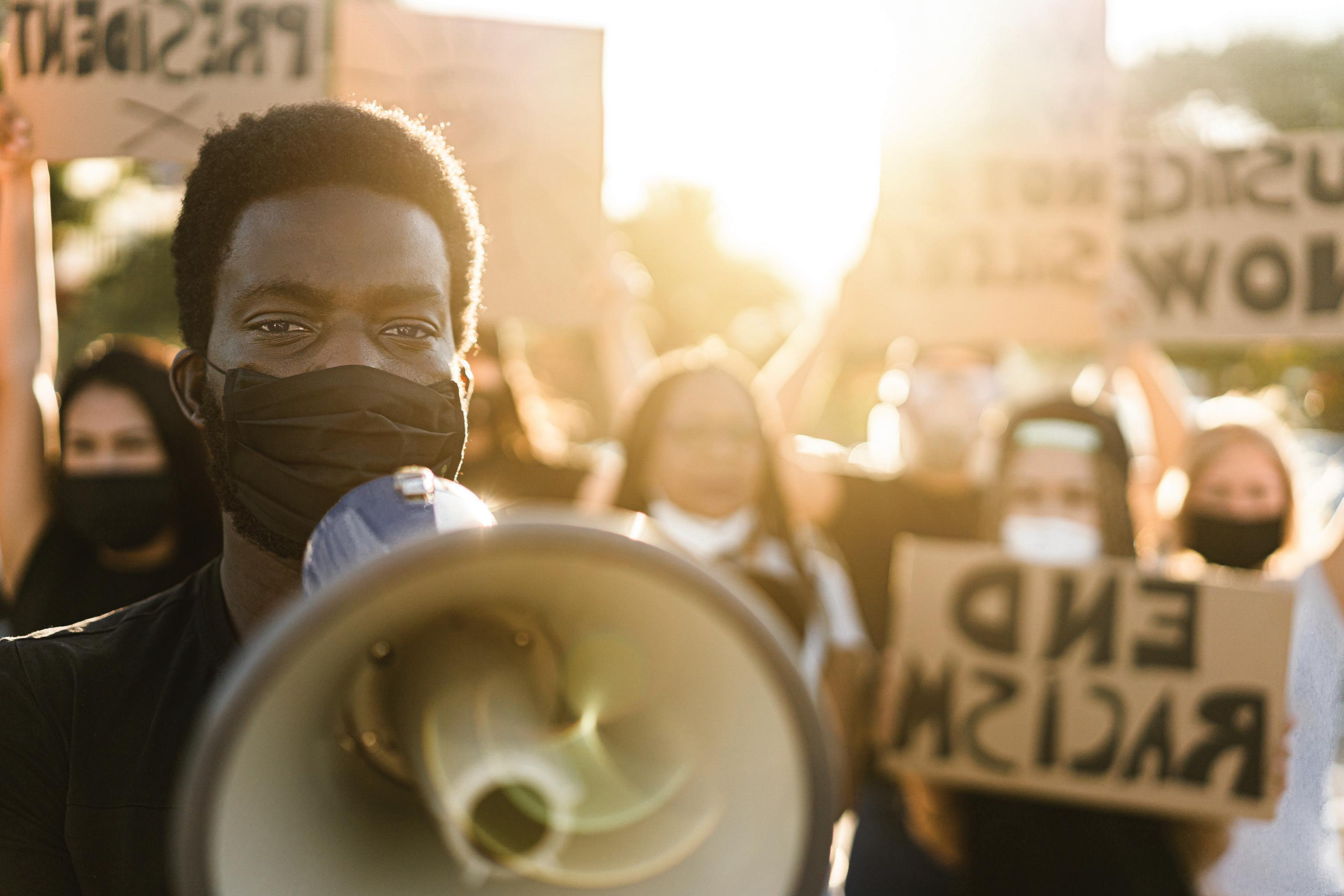
By Fredrick Nzwili Religion News Service
Five weeks after young Kenyans poured into the streets under the banner of “Gen Z,” forcing changes in the government, they have also called Christian churches to account for how denominations relate with politicians.
Rejecting a controversial finance bill floated by the government in June, the teenagers and young adults protesting have demanded wide-ranging reforms from President William Ruto, whom they have nicknamed Zacchaeus, after the diminutive chief tax collector who appears in the New Testament’s Gospel of Luke. For the protesters, reducing taxes is analogous to Zacchaeus climbing down the sycamore tree and meeting Jesus, as he does in the gospel.
Ruto withdrew the bill on June 26, a day after the youth stormed parliament, but the youth have continued to press for change, publishing a list of demands, including tackling corruption, ending impunity and unemployment and taming the rising cost of living.
“The young people have come out to protest because of the difficult life they are going through,” the Rev. Jackie Makena Mutuma, a young Methodist Church in Kenya cleric, told Religion News Service. “Many of them are unable to cope economically due to some government policies and the many burdening taxes.”
Though some of Kenya’s clergy have protested alongside the young people, some of the generation’s anger toward faith leaders arises from a view that some of the clerics and denominations were too
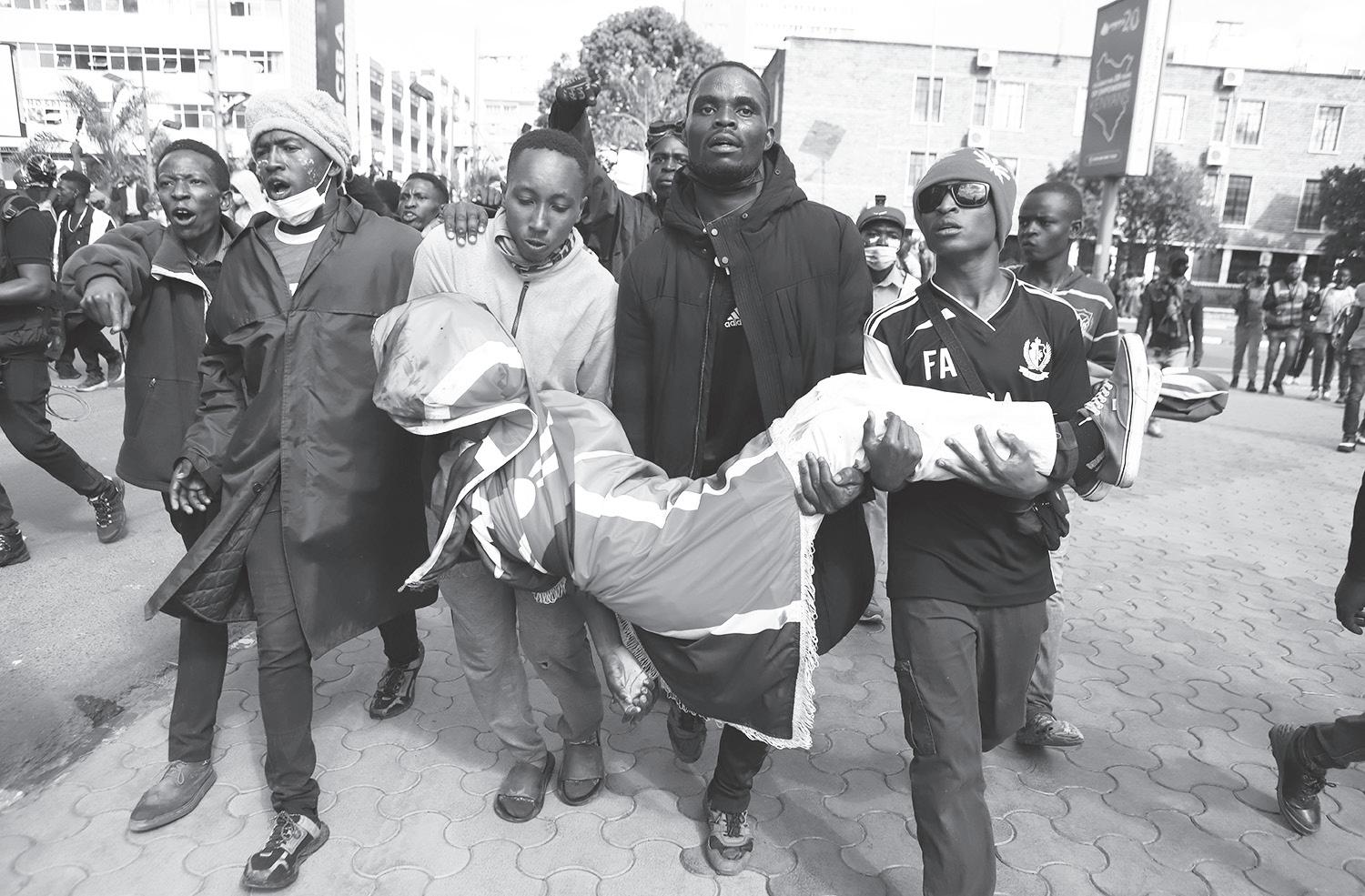
Among the social media hashtags that have cropped up during the protests, such as #OccupyParliament and #OccupyEverywhere, is #OccupyChurches.
“The young people felt the church was silent … as it was understood (during) the 2022 elections that it is ‘in bed’ with the government,” said Mutuma, who participated in some marches. “This is another
ing that politicians have been accused of looting cash from the government and donating it at church fundraisers, known as harambees, to which they’ve been invited.
“Widespread corruption and the misappropriation of funds by government officials meant for various development projects have eroded trust in the system,”
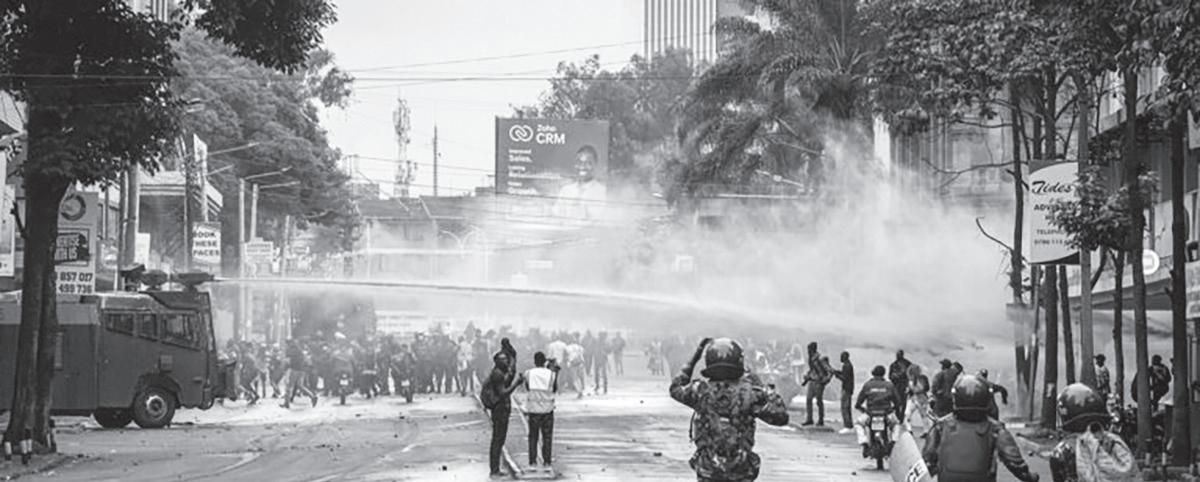
close to the state, according to the Rev. Joseph Njakai, an Anglican priest in the Diocese of Mt. Kenya West.
“It is a wakeup call for the churches,” he said. “The churches should remain independent, and I think the youth are angry that this is not the case. They are trying to cleanse the churches, already caught up in an unhealthy relationship with the political class.”
challenge. The church has to be proactive not reactive.”
Some 85% of Kenya’s 54 million population profess a Christian faith. About 11% are Muslims, while Baha’i, Hindu, Buddhism and African traditional religions constitute 2%. People under the age of 35, meanwhile, constitute 79% of the population.
Kevin Maina, a young Christian leader, pointed to the church leaders’ greed, say-
said Maina.
But more often, the church is seen as an ally of those officials. “This undermines the church’s moral authority and its ability to speak truth to power,” said Maina. “The church’s frequent visits to the State House (the Kenyan president’s official residence) and perceived exclusive consultations with the president, while neglecting direct engagement with the broader populace, particularly the youth, has amplified
doubts about the church’s impartiality and independence.”
Individual churches and mosques have supported the youth movement, calling for justice for those killed by law enforcement in the protests, while urging the youth leaders to accept offers to negotiate.
In Nairobi, the Roman Catholic Holy Family Basilica, the Anglican All Saints Cathedral and Jamia Mosque have all housed youth-led rescue and medical centers. On July 7, Catholic and Anglican leaders held interdenominational memorial and prayer services for the lives lost in the protests.
So far, the death toll stands at 50, with over 400 injured, the Kenya Human Rights Commission said on July 16. Human Rights groups say the police have been using live ammunition on the protesters.
“The killing of dozens of peacefully picketing Kenyans by the police is totally unacceptable. It must never be repeated,” said the Rev. Canon Chris Kinyanjui in a June 27 statement.
Since the protest, Ruto has signed a law allowing the constitution of the electoral commission and accepted the resignation of the inspector general of police.
Church leaders said this signals a move toward restoring hope, after Ruto had finally listened to the cry of the people, sharply brought about by the youth.
But Mutuma said despite the positive response, there are things the government could do better. “As a young Kenyan, I think we have passed our message. Our message is so clear,” she said.
‘I’m too
By Susan Budig Mshale
“Right now, music does everything I need,” said Seun Kuti, which is remarkable as this musician from Nigeria has been on stage since he was 9 years old and leading Egypt 80, the band once lead by his iconic father Fela, since he was 14.
Mshale chatted with the Grammynominated saxophonist recently. Unable to sit down for the interview, Kuti, shirtless, paced throughout his home in Lagos, energized by his thoughts as he clarified the power music held for him.
Now in his 27th year of collaboration with Egypt 80, Kuti remains true to his father’s vision and political bent. He said, “Music is my true calling. It’s the way I want to pass my message to the world. It is the legacy that I want to project for my future generations to see me through.”
Kuti sees music as both a means for self-expression and as a catalyst to activism. Like many musicians from Africa—The Gambia’s Sona Jobarteh, Bassekou Kouyate from Mali, to name a couple—Kuti holds onto a bigger picture, one that advances the continent of Africa with music as a fundamental conveyance.
“To the different nations in Africa,” Kuti said one hand holding his phone, the other
gesturing, “one of the greatest lies that have been told to us by the imperialists, the capitalists, is that Africans can only be developed from outside influence and foreign investments.”
This does not sit easy with Kuti. He said with emphasis, “Africans must be willing to sacrifice their own talents for the national development. But we’re being lied to, to think our talents [are] just for us to make the quick buck here and there, to be famous, to be rich, to be well-known. What about individual development we can attain from all our talents,” he asked.
“Just like every profession, I feel like Africans will most understand that our talents cannot be divorced from our national developments,” Kuti said, lassoing in more than entertainers, but also other professions.
“So it’s not just musicians,” he said. “I feel African lawyers have a role to play in African development. This means African justice means more to them than the dollars.
African doctors have a role to play in African development. African health means more to them than the dollar.
African engineers have a role to play in the development of Africa. Immediately, the construction of Africa makes more
sense to them than the American dollar.
The same applies to musicians. That he must understand that his talent will be willing to influence these people to greatness, to development, not just to make himself famous and rich.
So I think everything, everybody has a role to play in that aspect, not just the artist, the musician.”
Seun Kuti uses social media to expound on his ideas posting monologues lasting an hour or more. Despite his passion for lifting up the African citizen, he also recognizes the need to simply enjoy life. Not every moment must be a strident call to equality or justice.
“My music is…every actor has his role to play. Our people…in Africa there is a proverb that says the sky is big enough for all the birds to fly. So I think Africans need all this kind of music. Africans don’t need just revolutionary music because there are times, maybe we are not interested in the revolution, we just want to have a good time. We need music for that,” Kuti said.
His upcoming show, part of the Dey Tour “I’m too busy being myself”, will include new and very fun music featuring Damian Marley of the Bob Marley Jamaican family. A new album, Dey, in collaboration with

the Marley family will be released on June 26th, the very day Kuti will appear in Minneapolis.
As the interview on Zoom wrapped, Kuti reminded me, “But I think the sky, as I said before, is big for every bird to fly.”
Seun Kuti and Egypt 80 will appear at the Fine Line in Minneapolis July 26th. Ticket info at first-avenue.com.










